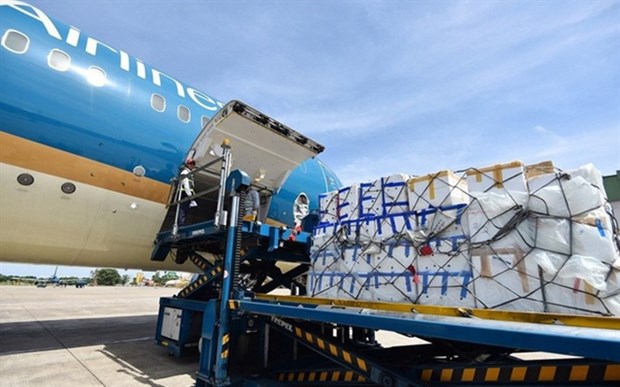Airport logistics companies report profits despite COVID-19
Although the aviation industry was ravaged by the COVID-19 pandemic, logistics companies at airports still maintained operations.
 Noi Bai Cargo Terminal Services reported revenue in the fourth quarter of 2020 of 205.6 billion VND, an increase of 11 percent in the same period last year. (Photo cafef.vn)
Noi Bai Cargo Terminal Services reported revenue in the fourth quarter of 2020 of 205.6 billion VND, an increase of 11 percent in the same period last year. (Photo cafef.vn)Noi Bai Cargo Terminal Services (NCT) reported revenue in the fourth quarter of 2020 of 205.6 billion VND (8.9 million USD), an increase of 11 percent over the same period last year.
It announced post-tax profit of 52.5 billion VND, an increase of 5.6 percent. The company attributed the profit increase to the receipt of a dividend of 7.1 billion VND from the out-of-business investment.
In the whole of 2020, the company achieved total revenue of nearly 697 billion VND, down 21.6 percent compared to 2019, and post-tax profit of 206.75 billion VND, down 14.6 percent, up 8 percent compared to the yearly plan. Earnings per share reached 7,495 VND.
According to NCT, the COVID-19 pandemic has had a great impact on the aviation industry and air cargo services. The output of goods to and from Noi Bai international airport decreased compared to 2019.
The company always followed market developments and worked closely with other airlines to maintain operational plans, especially exploiting freight flights.
Saigon Cargo Service Joint Stock Company (SCS) announced Q4 revenue of about 197 billion VND, a negligible decrease compared to the same period last year, after-tax profit reached 128.5 billion VND, down by nearly 5 percent.
For the whole of 2020, SCS' revenue reached nearly 693 billion VND, down 7.4 percent, while post-tax profit touched 464 billion VND, down 7.5 percent compared to 2019. SCS' gross profit margin decreased compared to the previous year but was still at a very high level of 78 percent.
According to a report by Transport Intelligence (Ti), twice in the past decade, the air transport market has been propelled by inventory re-stocking cycles. These were boosted by a rapid increase in new export orders growth, which takes place at a time when the global economy and trade are rapidly developing.
However, given capacity constraints, it is unlikely that air transport will increase so strongly next year.
After the global economy plunged to its lowest levels in April and May of this year, some cargo stockpiling took place, but the shipping industry witnessed the strongest increase in volume.
Ti expects both sea and air freight forwarding to see a strong boost from the industrial and automotive sectors next year, as well as from the healthcare and medicine sectors.
Car sales have fallen by 25-30 percent in the first half of 2020 but are expected to recover to around 17 percent for the full year.
With the possibility of launching several vaccines, the volume of air freight will increase. In September, IATA estimated delivery of a single dose to 7.8 billion people would fill up 8,000 B747 cargo planes. While other modalities like road and rail could be used, sufficient air transport capacity is essential for global rollout, according to the Ti report.
Meanwhile, the volume of cross-border e-commerce, driven by blockade measures, has accelerated this year, and will set a strong growth path in the future.
Ti forecasts that the air freight forwarding market will grow at a compound annual growth rate (GAGR) of 5.6 percent in the 2020-2024 period and the sea freight forwarding market will reach a CAGR of 5.2 percent.
The air transport market has lower growth. Its recovery would depend on the recovery of the number of passengers, Ti said./.












